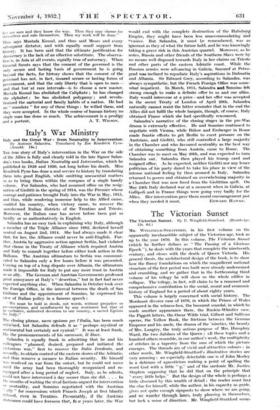Italy's War Ministry
Italy and the Great War : from Neutrality to Intervention. By Antonio. Salandra, Translated by Zoe Kendrick Pyne. (Arnold. 188.) THE true story of ItaIy's intervention in the War on the side of the Allies is fully, and clearly told in the late Signor Salan- dra's two books, Italian Neutrality and Intervention, which he
published in 1928 and 1930, not long before his death. Miss Kendrick Fyne has done a real service to history by translating them into good English, while omitting unessential matters so as to bring them within the compass of a single handy volume. For Salandra, who had assumed office on the resig- nation of Giolitti in the spring of 1914, was the Premier whose courage and patience brought Italy into the War in May, 1915, and thus, while rendering immense help to the Allied cause, enabled his country, when victory came, to recover the unredeemed Italian districts of the Trentino and Trieste. Moreover, the Italian case has never before been put so lucidly or so authoritatively in English.
Salandra has an easy task in explaining why Italy, although a member of the Triple Alliance since 1882, declared herself neutral on August 2nd, 1914. She had always made it clear that, for her, the Alliance could never be anti-English. Fur- ther, Austria by aggressive action against Serbia, had violated that clause in the Treaty of Alliance which required Austria and Italy to consult together before either took action in the Balkans. The Austrian ultimatum to Serbia was communi- cated to Salandra only a few hours before it was presented. Coming on top of a Tong dispute over Albania, the ultimatum made it impossible for Italy to put any more trust in Austria as an ally. The German and Austrian Governments professed great annoyance at Italy's "desertion," but in fact had never expected anything else. When Salandra in October took over the Foreign Office, in the interval between the death of San Giuliano and the appointment of Sonnino, he expressed his view of Italian policy in a famous speech : " We must be bold in deeds, not words, without prejudice or preconceptions, and uninfluenced by any sentiment but that of
an exclusive, unlimited devotion to our country, a sacred Egoism for Italy."
The closing phrase, sacro egoism° per l'Italia, has been much criticized, but Salandra defends it as "perhaps mystical or sentimental but certainly not cynical." It was at least frank, like the pronouncements of his successor, Ii Duce.
Salandra is equally frank in admitting that he and his colleagues " planned, desired, prepared and initiated the victorious war," first to recover the Italia Irredenla, and secondly, to obtain control of the eastern shores of the Adriatic, and thus remove a menace to Italian security. He himself was resolved on war from the outset, but he could not move until the army had been thoroughly reorganized and re- equipped after a long period of neglect. Italy, as he admits, eould not have intervened it day sooner than she did. . . . In the months of waiting the rival factions argued for intervention or neutrality, and Sonnino negotiated with the Austrian ally" for concessions which Francis Joseph at first bluntly refused, even in Trentino. Presumably, if the Austrian statesmen could have fereseen that, fon. years later, the War Would end with the complete destruction of the Habsburg Elapire, they might have been less unaccommodating and evasive. But Salandra, it must be remembered, was as 'ignorant is they of what the future held; and he was knowingly taking a grave risk in this Austrian quarrel. Moreover, as he notes, Russia and other friends of the Southern Slays were by no means well disposed towards Italy in her claims on Trieste and other parts of the eastern Adriatic coast. While the Russian armies' were advancing in Galicia, Sazonof at Petro- grad was inclined to repudiate Italy's aspirations in Dalmatia and Albania. Sir Edward Grey, according to Salandra, was always sympathetic, but the French Foreign Office was some- what impatient. In March, 1915, Salandra and Sonnino felt strong enough to make a 'definite offer- to us and our allies. Italy would intervene at a price—and her offer was accepted in the secret Treaty of London of April 20th. Salandra naturally cannot resist the bitter reminder that in the end the Allies did not fulfil the whole bargain, though, of course, Italy obtained Fiume which she had specifically renounced.
Salandra's narrative of the closing stages in the pre-Wat drama is extremely effective. He and Sonnino continued to negotiate with Vienna, while Billow and Erzberger in Rome made frantic efforts to get Berlin to exert pressure on the Austrians, and Giolitti, who still controlled a large majority 'in the Chamber and who favoured neutrality as the best way of obtaining something from Austria, came to Rome. The Chamber was to meet on May 20th, and was expected to turn Salandra 'out. Salandra then played his trump card and resigned office. As he expected, neither Giolitti nor any lesser politician of his party dared to take his place in view of the intense national feeling by then aroused in Italy. Salandra returned to power and obtained an overwhelming majority in a Chamber that was now freed from the Giolittian spell. On May 24th Italy declared war at a moment when in Galicia, at Gallipoli and in France things were going very badly for the Allies. Her intervention gave them moral encouragement just










































 Previous page
Previous page